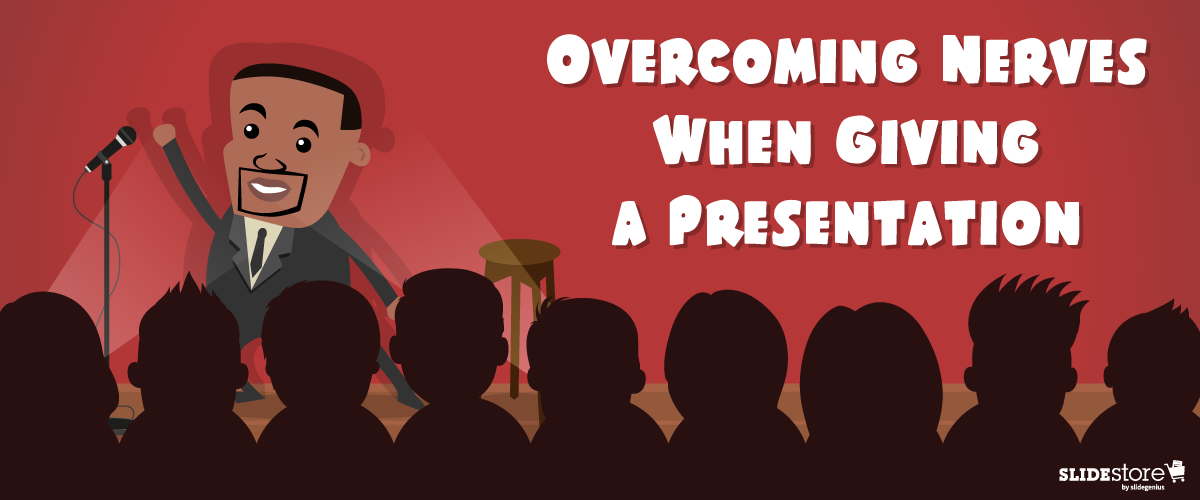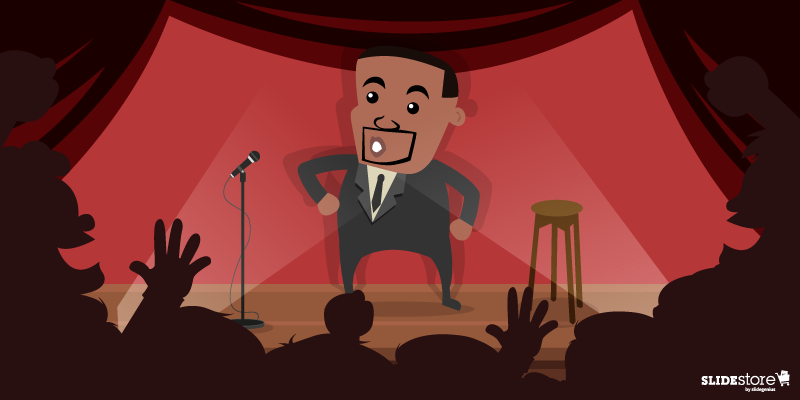
Giving a presentation doesn’t always come naturally, especially when standing in front of a crowd isn’t your forte. It’s a skill that takes time to learn and perform just like singing or acting.As much as you practice, though, one thing can derail you: stage fright. It’s a whole different experience when you’re rehearsing in a confined and controlled environment compared to when standing in front of a crowd.Fear is inevitable. It is the usual initial feeling people have when they’re aware that something bad can happen. However, most find themselves harboring and being crippled by that possibility for a long time. Ever heard of Murphy’s Law?You don’t have to experience the same fate. As long as you know how to avoid or fight it—and improve despite of and because of it—you won’t ever have to deal with bothersome stage frights.
Finding a Cure to Presentation Anxiety
Fighting off anxiety can be challenging. You never know when it will come and attack you. When it affects you, you feel weak, not knowing when it will go away. But fear isn’t a physical barrier. In fact, it‘s all in your head. You created it, and you can eliminate it.Anxiety occurs when you anticipate a bad event. It’s normal to feel anxious when you’re in a stressful situation. And it grows when you keep believing it’s true. The only way to destroy it is by understanding that it’s all in your mind and becoming proactive on it.Ask yourself the following questions: “What am I being anxious about?” “Where did it come from?” “Is now the time to think about it?” “Will it help me deliver my presentation?” Rationalizing points out the weight of your problem and its urgency. Breaking down your worries and your responsibilities helps you decide how to move along on your work. Instead of entertaining that fear, rehearse your pitch in your head. Your anxiety will be addressed by focusing on the task at hand. Stay on track and don’t let your mind wander off. Mentally pushing the nuisance to the far end of the room will make it leave.
Preventing Stage Fright Successfully
There are many reasons why presenters experience anxiety before and during a presentation. Apart from anticipating a faulty performance, procrastination, laziness, and carelessness are the other elements that trigger it. . Sometimes, the reason why you anticipate mistakes is because you know they are consequences of something you did wrong in the past. Maybe there’s a gap in your presentation that you deliberately neglected or maybe you can’t help but think about the practices you should have not missed. These simple yet reoccurring things can make you feel anxious on your big presentation day.Crafting a great presentation takes much research and preparation. Being able to come up with great research takes a lot of effort and time. And on top of all that hard work, it also takes a lot of practice to make sure you feel ready to present your deck.When you care to invest that much to prepare your pitch, consequences that make you anxious won’t get in the way. Instead, you gain confidence and feel empowered enough to present your pitch with your head held high.
Prepare, Present, and Prosper.
There’s no way of telling what’s going to happen next. Why waste time being fearful of outcomes you’re not even sure will happen? If you place fear in the present, you’ll see that it has no business being there. Your presentation should be the only thing on your mind when you walk onstage. The dialogue between you and your audience is your priority. Focus so that nothing can change the way you planned to deliver your pitch.Remember that prevention is better than cure. Make time to prepare your deck and rehearse your performance. Learn how to present your deck better than the last time. Nobody becomes a public speaking expert overnight. Plan your slides carefully and practice your lines.Lastly, don’t fear judgement or fill your mind with worry. You have the power to stop self-sabotaging thoughts.
Resources:
Bellamy, Wallace J. “Fear… It’s All in Your Head.” DrBellamyDMD.com. July 12, 2016. www.drbellamydmd.com/patient-education/fear-its-all-in-your-headEsposito, Janet. “Conquering Stage Fright.” Anxiety and Depression Society of America. n.d. www.adaa.org/understanding-anxiety/social-anxiety-disorder/treatment/conquering-stage-frightMaina, Antony. “16 Ways to Overcome Stage Fright When Speaking in Public.” Small Business Trends. October 6, 2015. www.smallbiztrends.com/2015/10/overcome-stage-fright-speaking-in-public.htmlPurtill, Corinne. “Murphy’s Law Is Totally Misunderstood and Is in Fact a Call to Excellence.” Quartz. May 16, 2017. www.qz.com/984181/murphys-law-is-totally-misunderstood-and-is-in-fact-a-call-to-excellenceReynolds, Garr. “Presentation Zen: Simple Ideas on Presentation Design and Delivery,” 2nd ed. Berkeley, CA: New Riders. 2012.“Managing Presentation Nerves: Coping with the Fear Within.” Mind Tools. n.d. www.mindtools.com/pages/article/PresentationNerves.htm




